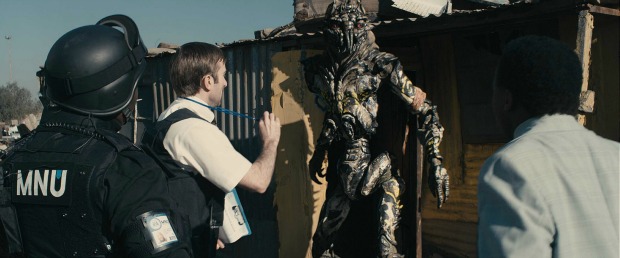District 9
The film is truly worth the buzz it has created, oozing with fresh, originality jelly and hitting the all important social commentary button without being obvious or simple.
Plot summary
An extraterrestrial race forced to live in slum-like conditions on Earth suddenly finds a kindred spirit in a government agent who is exposed to their biotechnology.

It is fairly common practice for big directors to enlist their hugely valuable names to debut films. It’s nothing new and it certainly holds no particular correlation to the standard of the film. Peter Jackson, however, clearly knew what he was doing when he helped big screen first timer Neill Blomkamp out with his sensational creation District 9. The film is truly worth the buzz it has created, oozing with fresh, originality jelly and hitting the all important social commentary button without being obvious or simple.
Blomkamp’s debut film asks this question: what would happen if Aliens landed in South Africa, a country with a history of segregation? Whatever the answer you can bet it will have a fair few more explosions and genetic mutations.
20 years ago a mysterious alien ship landed hovering over Johannesburg and remained for months absolutely unmoved and with no sign of life. After breaking in and discovering a race of Alien refugees the South African Government decide to employ a tactic of segregation, placing the aliens, or ‘prawns’ as they soon become derogatorily known, into the township of ‘District 9’. Over the next twenty years the alien population grows and the township becomes a slum. Nigerian rebels live among the aliens buying their weaponry for quite unreasonable amounts of cat food whilst the South African government decide enough is enough and the aliens must be moved further away from the city into a similarly unpromising township.
The film brilliantly utilises a documentary style narrative, snapping back and forth between interviews set in the present day and news reports from the ‘actual’ events as we become introduced to our protagonist Wikus van de Merve (Sharlto Colpey), the happy-go-lucky, dim-witted fellow put in charge of the operation. From the off you are enthralled by the events you are witnessing because the footage and interviews make you feel like this could be for real (I know, but they really do) and of course if this did happen it would be the single biggest thing to happen in history. So, naturally, in steps Wikus to take the reigns.
Wikus is a endearing, albeit initially idiotic central character as we follow his work moving around District 9 gathering enforced signatures of eviction from the ‘prawns’. Blompkamp creates a realistic, I believe, portrayal of how we might treat such visitors and the maddening bureaucratic procedures we would most likely put them through. This is aided much by the documentary style which makes it look like it could well be a hard hitting TV show on any slum in the world if it wasn’t for all the crustacean resembling aliens. Additionally, Colpey is fantastically watchable as the main man of the documentary and hilarious in his mishaps and attitude to the show and its horrible content.
It is when Wikus accidentally ingests some kind of Alien fluid, causing his body to slowly mutate into one of the aliens that the whole reason for imprisoning them becomes clear. Multi –national United, the supposedly humanitarian group in charge of the operation are looking to discover the secrets to the alien weaponry, something that, due to its ability to link only with the alien genetic structure becomes all the more possible once they discover Wikus’s secret. Wikus becomes the most wanted man in the world and the secret to a whole new world of biotechnology. His only option? To hide in District 9 of course.
The film then becomes disjointed in its use of the documentary style leaping back and forth from ‘footage’ to ‘fictional’ scenes which cleverly highlight the fact that much of Wikus’s story is unknown by the present day documentarians. In this sense Blomkamp has really created his own original spin on the film.
The film is fresh in absolutely every sense of the word, be it due to the entirely unknown cast, its location in the not-too-often-filmed city of Johannesburg, to its mocumentary style and masterfully mundane portrayal of the fantastic. The film, like its main character, is a hybrid, taking the otherwise fairly ordinary and overused science fiction genre and creating a genetically superior, original creature.
And the social commentary? Well, yes it’s there, perhaps truly bringing to light, through the displacement of prejudice on an entirely new species, how cruel the human race has and can be. And the aptly named ‘Multi-national United’ sets the tone for the hypocrisy of the humans in their treatment of the aliens. But setting it in South Africa was always going to subject the film to such interpretations. I believe Blomkamp simply saw what a hugely interesting dynamic the location of South Africa would have on the actual story, its history of violence and apartheid being enlisted to create perhaps a more worrying tension for the film’s characters. Seeing the film as social commentary, I think, detracts from the films glaring inventiveness as a science fiction film that manages to couple big block buster effects and action with ideas that break away from the mainstream in numerous ways. That, and its ability to entertain hugely, should be admired above all else.
What is certain is that Neill Blomkamp has, with his first big feature film, created an absolute belter.










COMMENTS